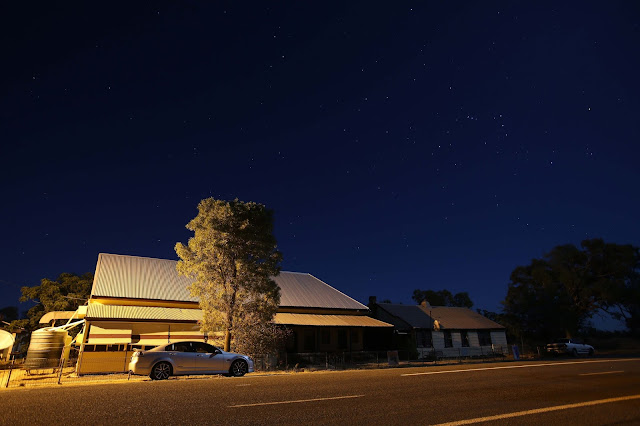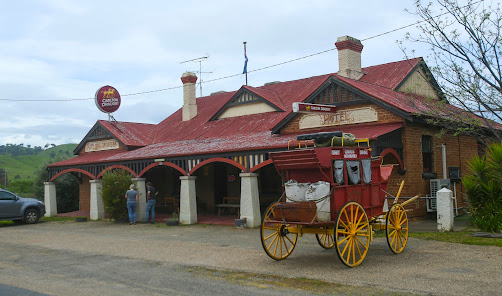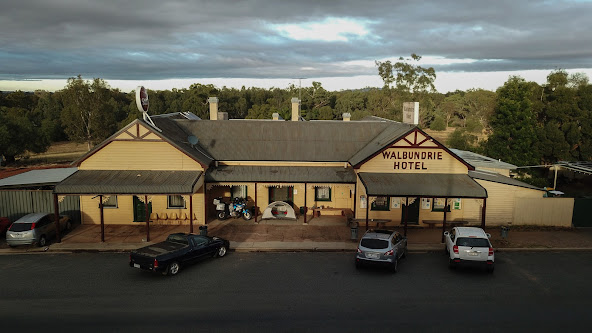Mary Crawley and the Tattersalls Hotel at Barringun, NSW.
There’s something about the outback.
You either ‘get’ it. Or you don’t.
The outback either touches your soul, or it doesn’t. You
connect with it, and, like artesian water, flow beneath its surface, feeding
off it and returning the richness it gives you or you skim over it, oblivious
to its rich and endlessly changing character.
As you ride, the change from mulga to box, from turpentine
to wilga, from gidgee to cypress to brigalow will enthral you or it’ll all just
be ‘trees’.
The earth’ll glide from brown to grey to black to red, from
sand to clay to iron stone or it’ll all just be dirt. The changes will either
transfix you or they’ll be unseen, unheard, untasted, unfelt and unknown.
‘Getting’ the outback
is about your soul not your senses. It’s about your core in tune with the
country’s heart.
In the 1880’s one of the more erudite transients, the Hon
(no less!) Harold Finch-Hatton published his, “Advance Australia! – An Account of 8 Years’ Work, Wandering and
Amusement in Qld, NSW and Victoria”.
The Hon Harold didn’t ‘get’ Sydney, writing that he was, “quite at a loss to imagine..where Sydney got
its reputation for beauty. I never saw,” he added, “anything
more forlornly ugly in the way scenery.”
But he ‘got’ the bush. He wrote of its ‘lifeless solitude’ then quickly added how, “the sensation of loneliness very soon wears off…and even the endless
trees come to look like friends.”
This pommie aristocrat felt the connect, he even honoured it
with a capitalised name: “There is a deep fascination about the
freedom of the Bush,” he wrote, “whose
subtle influence very soon enslaves those who go to live there, and generally
unsettles them for any other mode of living.”
The bush rewarded Harold with good finds of gold and despite
him elegantly insulting Mackay as the “Boeotia
of Australia” he got a really quaint town just 40 miles inland named after
him.
Not that everyone who lives out here is so ‘enslaved’. Fifty
years later Myrtle Rose White wrote “No Roads Go By’, an account of 7 mostly
wasted years with her husband in the outback working in the main for Sidney
Kidman.
Of her first night on the station, she wrote, “I crept forth to take a dejected survey of
the world outside…(t)he myriad stars were diamonds of the first order in that
clear rarefied atmosphere. But what an appalling loneliness! And what a
dreadful menacing silence…the terrible silence sinking in and sinking in…I
stood there in the terrible frightening dark. It was a feeling I never entirely
erased in all the years I lived in the bush.”
After seven years of hard slog, no nearer to owning their
own dream patch of dirt, the depression hitting, Kidman rewarded White’s
husband’s loyalty and effort by slashing his wages by 50%. White got
night-sweats but Kidman got a knight-hood.
And later he got a highway named after him. It stretches
from just outside Jerilderee in the south to, depending on your map, either
Bourke or 140kms further north on the NSW-Qld border at a fly spec town of
Barringun.
Barringun’s got a population of just four. There’s Darryl
(the only bloke in town) and his partner, Jan who run the Bush Tucker Inn (no
fuel) plus Darryl’s mother. And then there’s Mary who runs the pub a rock throw
to the south.
I’d heard about Mary and rang to let her know I was coming out
for a chat and a beer.
“You’ll be wasting
your time. I’m old and boring.”
I doubted that.
“And I’ve got no draft
beer.”
Which was fine because I have catholic tastes.
“And there’s no
accommodation.”
Not a problem ‘cause I have my own tent.
“Well the traffic’ll
keep you awake, there’s four or five trucks through here some nights.”
I thanked her for the encouragement, said I’d see her in a week or so and began packing.
Because a town of just four but still with a pub is enough
on its own to get me riding a couple of thousand kms. But when you throw in the fact that Mary, at
92 years is the oldest publican in the country, the whole thing changes from a
‘can do’ to a ‘gotta do’.
I get to Barringun with my left cheek burning from the sun
and find Mary in her favourite chair, Gidgee the dog at her feet. It’s Saturday
and there’s a decent crowd in. Peter one of Mary’s sons-in-law is helping out
whilst the boss puts her feet up.
I grab a $5.20 stubby and sit down beside Mary and we begin
chatting. The tale runs backward, the more recent stories come first and I keep
gently pushing her back. Back through the passing of her husband Bay and the
loss her oldest son, Michael.
Back through buying the pub in 1977 from Neil Lack, whose
late dad’d owned it for many years.
Back through the days when Bay worked in Bourke for Hales a
major retail store whose tag line was simply, “For Everything”
Back through the seven kids and their early local schooling
and then boarding down in Bathurst. Storeys of stories.
All this time Mary is holding a hand written note on a
crumpled sheet torn from a pad.
“I want you to read this and tell me what you think.”
Gidgee looks up as though understanding the import of the
note. I read it, both sides, and then I read it again.
Then, some 2 hours and 52 minutes after we first started,
Mary gets onto the day in 1948 when she first arrived out here.
With her 70 something year old mother and two kids, she flew
from Sydney with the Butler Air Transport Company. There were fuel stops at
Cessnock, Mendooran, Tooraweenah, Coonamble and Walgett before Mary caught
herself looking down from the long window of the De Havilland Dragon 84 at the
sun glistening off the river as the pilot used the Darling River for
navigation.
“As we headed west, I
looked down at that shining river and I thought: isn’t this so peaceful and
beautiful.” Mary pauses then adds, “And,
you know what, Colin? I’ve never ever changed…it was just glorious, it was
perfect.”
Mary simply ‘got’ it. Before she even set foot on it.
I hand Mary back the note. Gidgee looks up, seems to relax
an extra bit and lays her snout on the cool floorboards.
The pub has a stack of rooms (including a huge billiards
room) but Mary’s always slept in the front room, not because it’s next to the
road but because it faces east.
“The sunrises out here
are the best in the world,” she confides and the next morning from my tent
on the other side of the bitumen, a stupendous golden orb confirms her claim.
After shooting the sunrise, I finish my brew then head up to
the Bush Tucker Inn where Darryl cooks me up a decent breakfast then it’s back
to the pub.
Each Sunday Mary rises early and watches 6.00am Mass on her
television and when I get back she’s in her chair, massarged for the week and
with Gidgee beside.
The sun climbs until the awning shades our faces and I ask
Mary about Rose White’s ‘Appalling loneliness’ and ‘frightening dark’. She
tells me how she’s never lonely, how it’s good when people arrive, and it’s
good when they go. How the sounds of the wind in the trees, of the windmill
clanking, of livestock and native animals, and of the birds are the theme songs
of her life. She talks of the colours which change every moment and of the
countless stars at night. She talks of her love of a good cuppa and of her dog.
And after a while, Mary asks what I thought of the note.
 It was given to her in an envelope by a fella who’d come by
with his wife and two young daughters. He’d waited til the others’d headed to
the car and he and Mary were alone and he didn’t wait for Mary to open it.
It was given to her in an envelope by a fella who’d come by
with his wife and two young daughters. He’d waited til the others’d headed to
the car and he and Mary were alone and he didn’t wait for Mary to open it.
The note told of how, 20 years ago he’d passed through,
doing it tough and how he’d done something unspecified that’d weighed on this
conscience ever since. Also in the envelope was a ‘pineapple’ and the final
words were, ‘I hope you can forgive me.
Please find enclosed the $50 that was rightfully yours 20yrs ago. Chris.’
I told her that I understood. I told her that whether he’d
nicked money, booze or fuel, it would’ve troubled him stealing from someone
like her.
Because there might be ‘something’ about the outback that
some get, but everyone who meets her knows, there’s definitely something about Mary.
This incredible woman who’d told me she was boring with
nothing to say has given me over 7 hours of tape, over 400 minutes of
anecdotes, recollections and stories.
I pack up the tent and load Super Ten for the ride south,
graced with memories of one of the true legends of the outback.
A coupla days after visiting Mary, back in Bourke, I’m
graced with the company of Phillip Sullivan, a proud Ngemba man, under the
shade of a gum tree on the banks of the Darling.
The Ngemba are the traditional owners of the brown land
south of the river they know as the, ‘Barwon’. On the other bank, the
Barkindji, or ‘river people’ have lived since the dreaming.
For over an hour we talk about ‘getting’ the country.
He explains to me the connection and the relationship
between his mob and the river and then to the earth at large. He tells me a story, sets me a puzzle centred
on a group travelling in the vast dry heat and explaining their oneness with
the land.
At the end he explains the importance to his people of
‘getting’ the land,
“They know,” he
says with giant arms outstretched as is to encompass the world, “the land will either take care of them or
it will take them.”
It’s a quote I’ll never forget.
A few months later I’m out west again and hear on the mulga
wire that Mary’s in Bourke Hospital after a fall. Nothing broken and she’s on
the mend, but the family’s decided that she should no longer work alone. I call
a bit later and she’s back in the bar, sounding as good as ever. She asks when
I’m dropping by again and I tell her not as soon as I’d like, I’m too damn busy
writing a book about her!
-----
And then on February 15th 2019 I get a message from Bridget Gillespie. It reads:
Hey Col we wanted to let you know that
mum (Mary Crawley) died early this morning......
Mum was peaceful and we were with her."
And for once I have no words. Good bye, Mary, no-one who met you will ever forget you and no-one will escape dry-eyed from news of your passing.













This comment has been removed by the author.
ReplyDeleteSo sad to hear the news of Mary's passing today. We had the privilege of visiting Mary at the hotel at Barringun on several occasions, on our way to and from Qld, and always enjoyed her country hospitality and friendly conversation. The Outback certainly touched her soul all those years ago! The world is indeed a poorer place for her passing. RIP dear Mary.
ReplyDelete